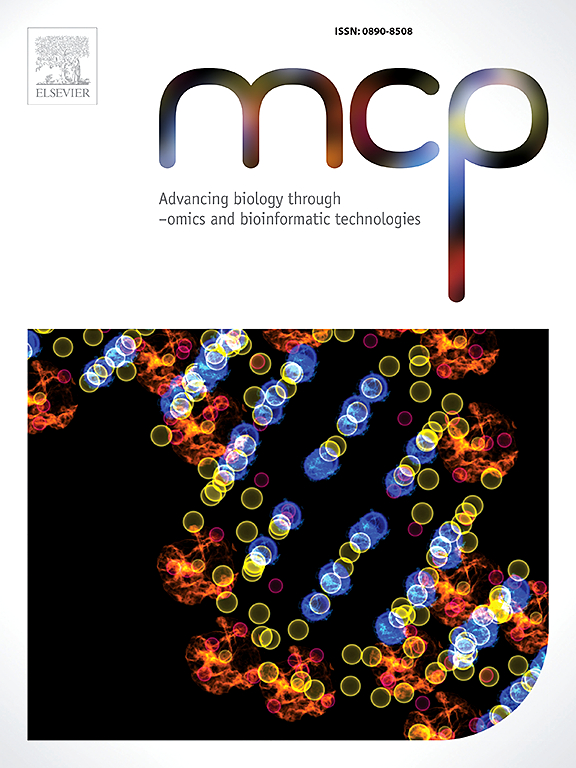miR-28-3p通过靶向ARF6/Hedgehog轴抑制胃癌生长和emt驱动的转移。
IF 2.3
3区 生物学
Q3 BIOCHEMICAL RESEARCH METHODS
引用次数: 0
摘要
胃癌(GC)是全球最常见的恶性肿瘤之一,其转移率快,死亡率高。虽然microRNAs (miRNAs)已被认为是肿瘤进展的关键调节因子,但miR-28-3p在胃癌中的具体作用尚不清楚。在本研究中,我们证明了miR-28-3p在体外通过抑制GC细胞增殖和emt驱动的迁移以及体内肿瘤生长和转移来发挥肿瘤抑制作用。在机制上,miR-28-3p直接靶向ADP核糖化因子6 (ARF6),这是一种小的GTPase,在GC中被认为是一种致癌基因。我们发现ARF6在GC中显著上调,激活gli1 /2依赖性Hedgehog信号通路,促进肿瘤生长和EMT。值得注意的是,ARF6敲低可减轻miR-28-3p缺失引起的促肿瘤作用,而ARF6抑制与Hedgehog途径抑制联合作用则具有协同抗肿瘤作用。本研究确定miR-28-3p-ARF6-Hedgehog信号轴是GC进展的关键调控途径。我们的研究结果为GC的发病机制提供了新的见解,并强调了针对这一轴的创新治疗策略的治疗潜力。本文章由计算机程序翻译,如有差异,请以英文原文为准。
miR-28–3p suppresses gastric cancer growth and EMT-driven metastasis by targeting the ARF6/Hedgehog axis
Gastric cancer (GC), among the most prevalent malignant tumors globally, demonstrates a rapid metastasis rate leading to high mortality. While microRNAs (miRNAs) have been recognized as critical regulators of tumor progression, the specific role of miR-28–3p in GC remains unclear. In this study, we demonstrate that miR-28–3p acts as a tumor suppressor by inhibiting GC cell proliferation and EMT-driven migration in vitro, as well as tumor growth and metastasis in vivo. Mechanistically, miR-28–3p directly targets ADP ribosylation factor 6 (ARF6), a small GTPase identified as an oncogene in GC. We reveal that ARF6 is significantly upregulated in GC and activates the GLI1/2-dependent Hedgehog signaling pathway, promoting tumor growth and EMT. Notably, ARF6 knockdown mitigates the pro-tumor effects caused by miR-28–3p deficiency, while combined ARF6 inhibition and Hedgehog pathway suppression exhibit synergistic anti-tumor effects. This study establishes the miR-28-3p-ARF6-Hedgehog signaling axis as a critical regulatory pathway in GC progression. Our findings provide novel insights into GC pathogenesis and highlight the therapeutic potential of targeting this axis for innovative treatment strategies.
求助全文
通过发布文献求助,成功后即可免费获取论文全文。
去求助
来源期刊

Molecular and Cellular Probes
生物-生化研究方法
CiteScore
6.80
自引率
0.00%
发文量
52
审稿时长
16 days
期刊介绍:
MCP - Advancing biology through–omics and bioinformatic technologies wants to capture outcomes from the current revolution in molecular technologies and sciences. The journal has broadened its scope and embraces any high quality research papers, reviews and opinions in areas including, but not limited to, molecular biology, cell biology, biochemistry, immunology, physiology, epidemiology, ecology, virology, microbiology, parasitology, genetics, evolutionary biology, genomics (including metagenomics), bioinformatics, proteomics, metabolomics, glycomics, and lipidomics. Submissions with a technology-driven focus on understanding normal biological or disease processes as well as conceptual advances and paradigm shifts are particularly encouraged. The Editors welcome fundamental or applied research areas; pre-submission enquiries about advanced draft manuscripts are welcomed. Top quality research and manuscripts will be fast-tracked.
 求助内容:
求助内容: 应助结果提醒方式:
应助结果提醒方式:


